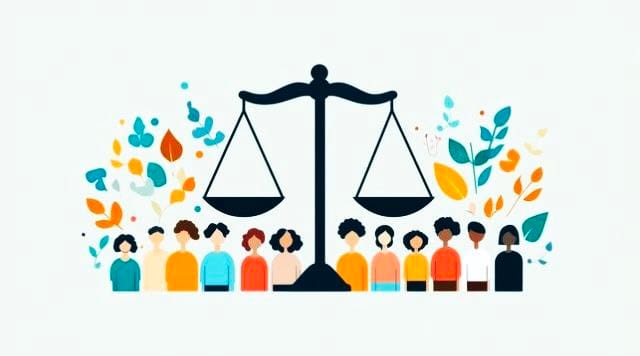Egalitarianism is a philosophical perspective that advocates for the principle of equality, where all individuals should be treated equally in terms of rights, opportunities, and social status. It promotes the idea that everyone, regardless of their background or characteristics, should have equal access to resources, opportunities, and justice.

Core Principles of Egalitarianism
- Moral Equality: All human beings are inherently equal in moral worth, deserving the same respect and dignity.
- This means that no one person’s life, interests, or rights are more important than another’s based on arbitrary factors such as race, gender, or wealth.
- Equal Opportunities: Everyone should have the same chances to succeed or achieve their potential in life.
- Egalitarianism argues for removing barriers like poverty, discrimination, and social disadvantages so that individuals can compete on a level playing field.
- Fair Distribution of Resources: Egalitarians often advocate for more equitable distribution of wealth and resources, as extreme economic inequalities can hinder social justice and equal opportunities.
- This can lead to policies that seek to redistribute wealth to ensure that basic needs like education, healthcare, and housing are accessible to all.
- Social Justice: Egalitarianism seeks to create a society where resources, power, and opportunities are fairly distributed, and where marginalized or disadvantaged groups are empowered.
- It is often associated with fighting against structural inequalities like racism, sexism, and classism.

Types of Egalitarianism
- Political Egalitarianism
- Focuses on equal political rights, where every individual should have the same ability to participate in the political process.
- Advocates for policies like universal suffrage, equal representation, and eliminating political corruption that gives some groups undue influence.
- Economic Egalitarianism
- Seeks to reduce income and wealth inequality, believing that extreme disparities in wealth lead to social injustice and prevent true equality of opportunity.
- This form of egalitarianism can manifest in support for progressive taxation, universal basic income, or wealth redistribution.
- Social Egalitarianism
- Advocates for eliminating social hierarchies that privilege some individuals or groups over others based on factors like class, gender, race, or ethnicity.
- It involves challenging traditional social norms and institutions that maintain social inequality.
- Gender Egalitarianism
- Focuses on achieving equality between genders, emphasizing that men, women, and non-binary individuals should have equal rights and opportunities in all areas of life.
- This includes fighting for equal pay, reproductive rights, and an end to gender-based violence and discrimination.
- Racial and Ethnic Egalitarianism
- Seeks to eliminate racial and ethnic discrimination and achieve equality across different racial and ethnic groups.
- This involves dismantling systemic racism, promoting diversity, and ensuring fair treatment and representation for all racial and ethnic communities.

Key Concepts in Egalitarian Thought
- Equality of Opportunity vs. Equality of Outcome:
- Equality of Opportunity: Everyone should have the same starting point, with no artificial barriers based on background or identity. This is often seen in liberal egalitarianism, which focuses on equal access to resources like education and employment.
- Equality of Outcome: Seeks to ensure that everyone ends up in similar economic and social conditions. This might require redistributing resources to compensate for inherent or historical disadvantages.
- Luck Egalitarianism:
- A theory that argues inequalities should only be acceptable if they arise from individual choices rather than circumstances beyond a person’s control (such as race, gender, or birthplace).
- It distinguishes between “brute luck” (unearned advantages or disadvantages) and “option luck” (inequalities based on personal decisions).
- Relational Egalitarianism:
- Focuses on relationships of equality, emphasizing that people should not be treated as inferiors or superiors in social and political contexts.
- Relational egalitarians argue that equality is about more than just wealth and resources; it’s also about creating social relationships that reflect mutual respect and equal standing.

Criticism of Egalitarianism
While egalitarianism is widely respected as a moral ideal, there are several critiques:
- Meritocracy: Some argue that people should be rewarded based on their effort, skills, and achievements, not forced to share equally in resources.
- Critics claim that too much emphasis on equality can undermine incentives for hard work or innovation.
- Practical Implementation: Achieving absolute equality, especially economic equality, may be impractical or harmful. Redistribution of wealth, for example, can be challenging without stifling individual freedoms or market dynamics.
- Libertarian Objections: Libertarians argue that egalitarianism, especially economic redistribution, infringes on personal freedom and property rights. They believe that individuals should have the right to keep the fruits of their labor without government interference.
- Cultural Concerns: Some critics argue that egalitarianism can overlook important cultural differences and values, particularly in multicultural societies where different groups may have distinct views on what constitutes fairness or equality.
Egalitarianism in Practice
Egalitarian principles have shaped numerous social, political, and economic reforms, such as:
- Welfare programs: Providing support to those in need to reduce economic inequality.
- Anti-discrimination laws: Ensuring that people are treated equally regardless of their race, gender, or other characteristics.
- Universal healthcare and education: Promoting equal access to essential services for all citizens.
Egalitarianism has influenced many modern political movements and ideologies, including socialism, social democracy, and feminism. These movements aim to create societies where everyone has equal opportunities to succeed and where unjust inequalities are addressed.
In summary, egalitarianism is a comprehensive framework that advocates for equal rights and opportunities across various domains of life, seeking to create a just and equitable society where everyone is treated with fairness and dignity.


I have been checking out a few of your posts and it’s nice stuff. I will surely bookmark your site.
https://kyakarehindimei.com/ja2g
Aw, i thought this was an incredibly nice post. In notion I have to set up writing like this moreover – taking time and actual effort to have a really good article… but so what can I say… I procrastinate alot by no means manage to get something accomplished.
https://kyakarehindimei.com/ja2g
F*ckin’ remarkable issues here. I am very satisfied to look your post. Thanks a lot and i am looking ahead to touch you. Will you kindly drop me a e-mail?
https://imagetwist.com/dg0wbdwh220m/pexels-freestockpro-321552.jpg
Oh my goodness! an incredible article dude. Thanks a ton However We are experiencing problem with ur rss . Don’t know why Struggling to register for it. Perhaps there is everyone finding identical rss difficulty? Anyone who knows kindly respond. Thnkx
https://imagetwist.com/dg0wbdwh220m/pexels-freestockpro-321552.jpg
I’ve recently started a blog, and the information you provide on this web site has helped me greatly. Thank you for all of your time & work.
https://kyakarehindimei.com/how-to-earn-money-from-the-stock-market-full-guide/
Some truly interesting points you have written. Aided me a lot, just what I was looking for : D.
https://kyakarehindimei.com/how-to-earn-money-from-the-stock-market-full-guide/
Read the full written content. There is certainly several definitely helpful details here. thankyou. “Much speech is one thing, well-timed speech is another.” by Sophocles..
https://kyakarehindimei.com/rekha-gupta-e0a4a6e0a4bfe0a4b2e0a58de0a4b2e0a580-e0a495e0a580-e0a4a8e0a488-chief-minister/